
As I have written before, there is a striking resemblance between the way many of the tunes are written in Gillies’ MS (read the first excerpt of my analysis here) and the way they were subsequently published in the Piobaireachd Society collection and the Kilberry Books.
We should remember that the MS was written upwards of 19 years before the Society was formed, at least 44 years before Archibald Campbell began his editing career with PS Book 2, and more than 60 years before his own Kilberry Book emerged.
Here is what Gillies has for the first few bars of the Laird of Anapool for example. Compare it with the PS version:
Black Donald’s March is written by Gillies in 6/8 time in the MS with the low As as connecting notes – as they should be. This is one tune where Campbell does not follow Gillies’ timing, though strangely he states in the Society collection that what he has represented is as played by him. Was the 4/4 timing an attempt to get pipers away from the ‘waltzy’ approach that 6/8 encourages? Nowadays things have swung too much the other way of course. Often we hear Black Donald with an exaggerated fourth beat with this ‘4/4’ approach hindering flow. The best timing is somewhere between both signatures. Bob Nicol’s interpretation is worth listening to in the ‘Masters of Piobaireachd’ series.
Now take a look at the Lament for Colin Roy as Gillies has it. Couldn’t you just play that off the page and be pretty close to what is required in this masterpiece of a tune? Clearly in 3 /4 time we see the dres and the dare with the short first note rather than the gracenote – a way of writing many believe assists better execution and clarity. That aside, what Gillies has is very close to what the PS prints – and documented years before the series of Books 1 -16 began:
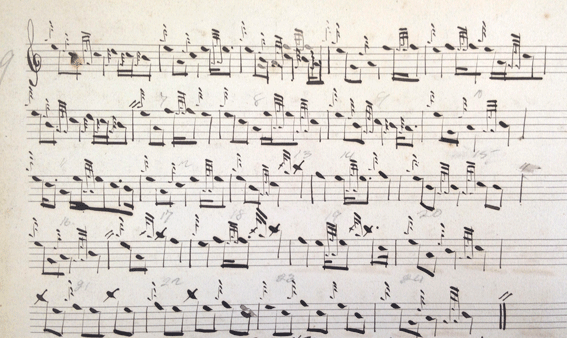
So whilst there are a few examples of differences, the majority of tunes in the MS (and other printed sources of the mid to late 19th century such as William Ross and Glen) are close to what Archibald Campbell subsequently produced and what we follow today in the main publications. So where does this leave writers such as William Donaldson and Alistair Campsie who upheld the view that he (Campbell) contorted the music to his own and the Piobaireachd Society’s baleful end? Short of claiming that Gillies and others were in on the ‘plot’ I can’t see any explanation. It all becomes rather silly the more one thinks about it.
Some of the points in the MS which may be of interest to the piobaireachd enthusiast viz:
- Gillies occasionally uses the fermata or pause mark – a practice overused by Kilberry in his book.
- There is no evidence of the open fosgailte or fosgailte ‘a mach’ being played at the end of tunes such as The Groat or the King’s Taxes.
- For speed of writing, gracenotes are sometimes omitted from variations.
- Taorluaths and crunluaths are written with the ‘redundant’ A:
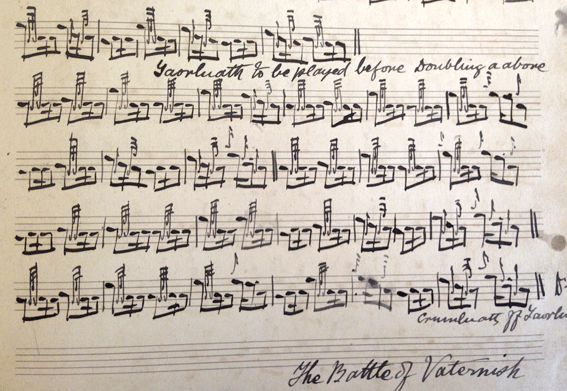
- Hiharin is usually written:

which is more or less as we play it today.
- ‘Cadence’ Es are written as semi quaver gracenotes.
- Where these Es form part of the time signature they are written out as main notes.
- Double echoes are usually written:
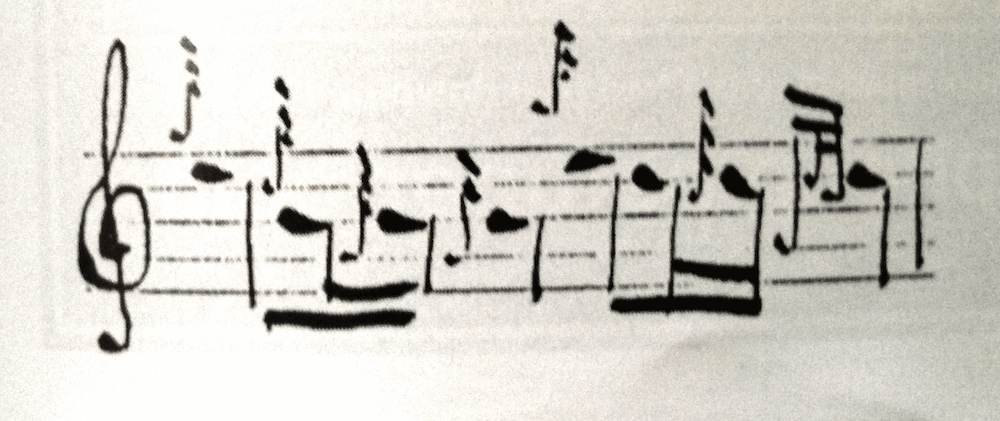
(note the strike to C as played by the Camerons and RU Brown, not low G), so no change there, and remember this is from a manuscript written 130 plus years ago.
- MacSwan of Roaig has the rundown B to low G as played by Reid – check the archive on the PS website.
- The breabach of the Little Supper is written with the emphasis on the second connecting note, though not all breabachs in the MS follow this rule.
- There are no time signatures given throughout the MS.
Most tunes are marked DC (da capo) at the end – meaning the urlar should be played again. Clearly the tradition of playing the ground between variations had been discarded by Gillies’s time of writing. Whilst on this point, I believe it a retrograde step when this practice is resurrected today when pipers are asked to submit MacArthur or Donald MacDonald tunes. It mitigates against their being played more often and for pleasure. Hector MacLean’s Warning, is a case in point. MacArthur’s is a superior setting. Its choice should not be prejudiced by any insistence that the ground be repeated as marked. We do not insist on this when Angus MacKay marks his settings thus do we?
But back to Gillies. James Campbell’s comment that the MS was intended as an aide memoir is, as I have said, a little wide of the mark, especially if we look at the book in its entirety. The setting of tunes is detailed not cursory. Beloved Scotland :
(We never hear the taorluath played in this fashion, do we?)
In conclusion, I am sure it is a fair to extrapolate a fair bit of authoritative guidance from what Gillies has put down on paper. Pipers do not go out of their way to confuse themselves, and where it was easy to replicate what he actually did on the pipe there can be no doubt that Gillies would have followed this course.
On the question of veracity, five tunes are signed and dated December 1879, and fourteen October and November 1884.
Of those pieces not named I recognised many, but strangely there is no mention of MacFarlane’s Gathering in the manuscript, a tune apparently collected by Gillies in Glendaruel; yet its bedfellow, Too Long in the Condition, is carried in full. Perhaps by late 1884 he had yet to serendipitously prise open the bothy biscuit tin that contained said MacFarlane’s transcript.
The full list of tunes is:
Your’re Drunk and Had Better Sleep (the Big Spree to us) Cameron’s Gathering
Unjust Incarceration
Queen Anne’s Lament
The Bicker
End of the Great Bridge
Dispraising the MacLeod
The MacDonald’s Are Simple
Colin Roy MacKenzie’s Lament
The Groat
MacDougall’s Gathering
Blind Piper’s Obstinacy
Sister’s Lament
Brother’s Lament
King James the Third’s Lament ( to us Lament for the Departure of King James)
Red Alasdair MacDonnell of Glengarry’s Lament (Alasdair Dearg)
Battle of Balladruishaig
Clan Chattan’s Gathering
Lord Anapool’s Lament (The Laird of)
Cill Chriosda (Glengarry’s March)
Findlay’s Lament
Welcome Johnny Back Again
Lament for the Castle of Dunyveg
MacLaine of Lochbuie’s Lament
Unnamed tune No 38
Fraser’s Salute
Little Finger Tune
Beloved Scotland I Leave Thee Gloomy
You’re Welcome Ewen
Nameless tune No 31
Nameless tune No 32 (written below is what appears to be ‘Are You Sad’)
The Fingerlock
MacCrimmon’s Sweetheart
Mary’s Praise
The Little Supper
Sword’s Lament
Battle of Vaternish
Old Woman’s Lullaby
Catherine’s Lament
Black Donald’s March
Desperate Battle
Too Long in This Condition
Weighing from Land – ‘A boat rowing tune’, dated 12th Nov.1884
The Tune of Strife
King’s Taxes
MacLeod’s Short Tune, a Lament on the MacLeod
Flame of Wrath for Squinting Peter ‘composed by his brother Donald MacCrimmon’
Daughter’s Lament
Nameless tune from Campbell Cant. (p420 in Bk13)
The Bard’s Lament
Mrs Smith’s Salute
No Name then below is written what appears to be ‘c—-h air cloich’
No Name then below is written MacKay’s March
Lord Annapuil’s Lament ‘D Campbell’s style’
Sutherland’s Gathering
Children’s Lament
Donald Gruamach
An tarm Breachd Dearg [Red Speckled Bull]
John Garve of Coll’s Lament
Nameless tune page no.96
Nameless tune page no.97
Kinlochmoidart’s Salute (Lament No2 to us)
MacSwan of Roaig
Massacre of Glencoe
Bodach na Slighan
Battle of Auldearn
Fairy Flag
Earl of Antrim
MacDonell of Laggan’s Lament (Donald of Laggan)
Cogadh na Sith (War or Piece)
Lament for Price Henry of Battenburg
MacDougall of Lorne’s March
MacDougall of Lorne’s Lament
MacNab’s Gathering
MacDonald of Lunday’s Lament
Ronald MacDonald of Morar’s Lament
Two airs
Bodach na Slighan ‘evidently copied from Major William MacKinnon’s sheet’
Fear na Breachan Dubh
Duke of Hamilton
[wds id=”7″]

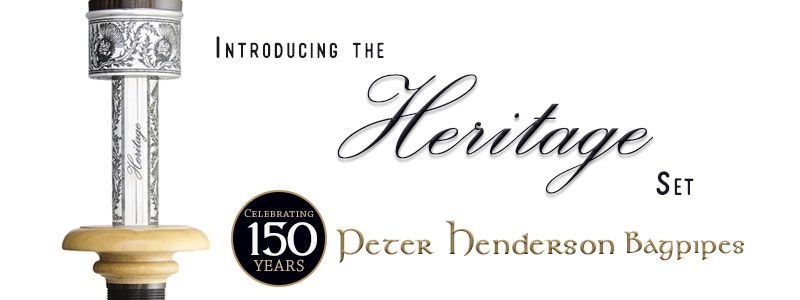









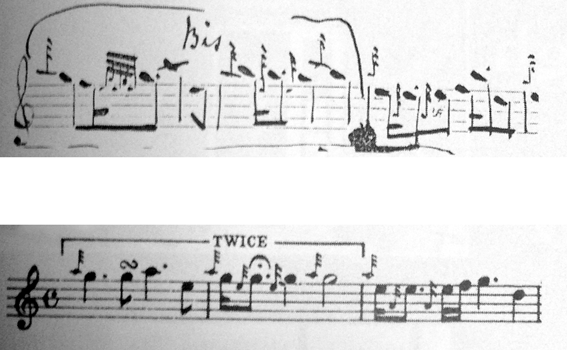
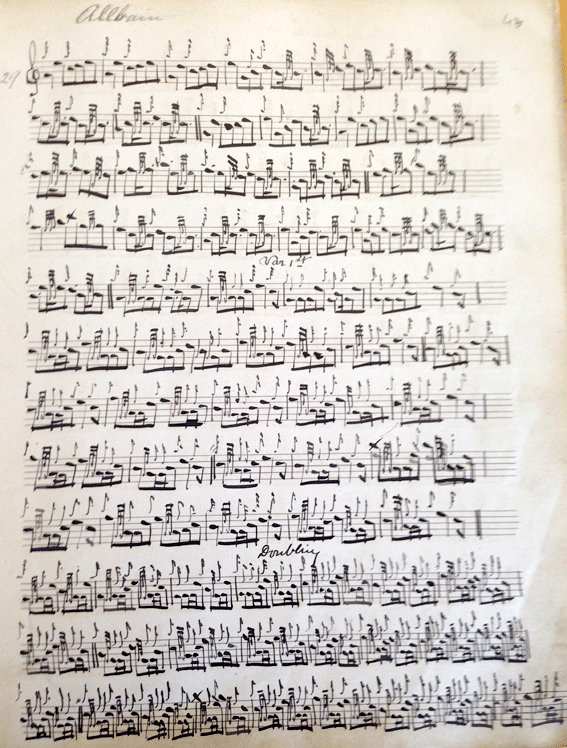
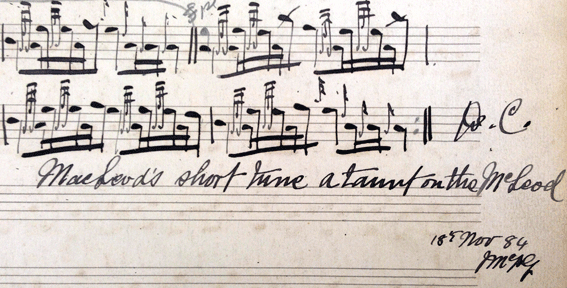








Gillies collected MacFarlane’s Gathering in 1894, following an appeal by Henry Whyte (Fionn).